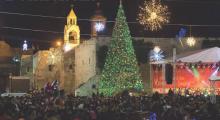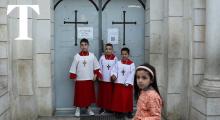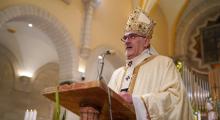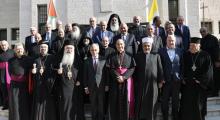Issued by the Catholic Center for Studies and Media - Jordan. Editor-in-chief Fr. Rif'at Bader - موقع أبونا abouna.org
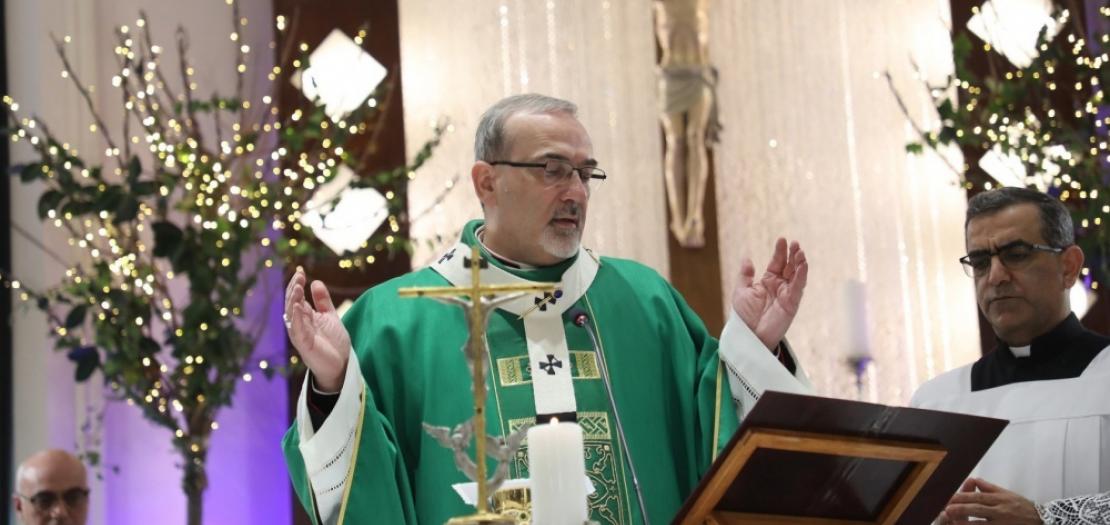
Following is the text of the meditation by Latin Patriarch of Jerusalem His Beatitude Pierbattista Pizzaballa for the third Sunday of Advent, December 11, 2022:
In the Gospel of this Third Sunday of Advent (Matthew 11:1-11), we find the figure of John the Baptist, and we find him no longer in the desert, where he invited everyone to conversion and to the expectation of the One who was to come, but in prison, incarcerated and bound to silence by Herod Antipas (see Matthew 14:3-4).
In prison, John learns of the works of Jesus and is shocked: he announced the coming of a Messiah who would cleanse (Matthew 4:12), a Messiah of fire who would finally put everything in its place, a Messiah that everyone was expecting. But the news that he has of Him does not correspond to anything in this image.
Hence, the question that John sends to Jesus through his disciples: “Are you the one who is to come, or must we expect another?” (Matthew 11:3). It’s a vital question for the Baptist. He has spent his entire life on this Jesus. Probably he knows that from this prison he will not leave alive. With that question, it’s as if he was saying: are you the one for whom I have spent my whole life and for whom I will die? Why doesn’t what I announced regarding you happen? Perhaps I mistook everything?
There is something strange in the words of Jesus that does not respond directly to the question.
Jesus sends back to John what he already knows, what is happening and what is clear to everyone. It’s happening that the blind people see, the lame walk, the lepers are healed. The reference is clear in different messianic oracles of the prophet Isaiah.
We take verse 4 as a reference: “go and report to John what you heard and saw.”
To say that it is not only to see, but also to hear, or rather to understand that what is happening is exactly the fulfillment of the Word that Israel heard for centuries; it was to understand that, finally, the two things coincided, that what the eyes saw was also what the ears heard. The promise of God, his Word was unfolding.
And this, for us, means that one does not see if one has not first heard, that to see and to hear must go together. If we see the events of life without a Word that resonates in the heart, we do not understand the meaning of what is happening. We see as much as we believe, and not the contrary.
But there is also an originality in the words of Jesus. In quoting the messianic oracles, Jesus makes a choice: He takes something and leaves something else. He does not quote the citations in their entirety. He omits all that speaks about vengeance, punishment, chastisement, while He underlines His preference for the poor, for the least, to whom He announced the good news. He cites, for example, Isaiah 61:1 which speaks of the liberation of prisoners: “to proclaim… release to prisoners,” but omits the second part of the same sentence, which speaks about “the day of vengeance of our God”, (Isaiah 61:2). And it is exactly this that threatens to confuse, disappoint, or even scandalize John. For this reason, Jesus adds at the end: “And blessed is the one who takes no offense at me!” (Matthew 11:6)
John, like everyone, must make the effort to accept this news. After inviting everyone, in the desert, to convert, now, in prison, it is he who must do it. And that is the most difficult conversion because it is not so much confessing ones’ sins as much as changing the image that one has of God, of accepting a different God from the one expected.
The term Jesus uses at the end of His answer is very strong, referring to the possibility of being scandalized by Him.
But there are two kinds of scandal.
There is the good scandal of one who is surprised by a God like this, who makes Himself small and poor to reach the small and poor; a God who renounces vengeance and power and chooses to love everyone. And there is the scandal of one who shuts out this news, one who cannot accept a God like this.
Between these two kinds of scandal, there is room for conversion, to which we are once again called, and which involves our entire life.
In this regard, perhaps one should read again the words of Jesus at the end of the passage when He says that there is no one greater than John, but whoever belongs to the Kingdom is greater than he. (Matthew 11:11)
To say that whoever, by grace, accepts the scandal of the good news of Christ and allows his life to be transformed by it is born again: no longer the life of one who is simply born from woman, but the very life of God in us.
+ Pierbattista


